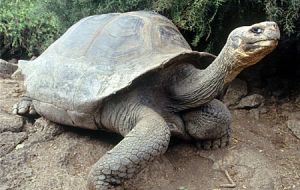MercoPress. South Atlantic News Agency
U.N. declares Ecuador's Galapagos Islands in danger
 Many of the species on the islands are found nowhere else on Earth
Many of the species on the islands are found nowhere else on Earth The Galapagos Islands in Ecuador and Senegal's Niokolo-Koba National Park have been inscribed on the List of World Heritage in Danger, the United Nations Educational, Scientific and Cultural Organization announced today.
The World Heritage Committee, which is meeting this week in Christchurch, New Zealand, added the two sites to the Danger List as part of its review of the state of the conservation of the 830 sites on the World Heritage List. Inclusion on the Danger List is intended to mobilize support for sites whose outstanding universal value is under threat. In 1978 the Galápagos area, which is now comprised of 19 islands and the surrounding marine reserve about 1,000 kilometres from the Ecuadorian mainland, became the first site to be placed on the World Heritage List in recognition of its value as a "living museum and showcase of evolution." But invasive species, growing tourism and immigration have combined to threaten the health of the islands. In the past 15 years the number of days spent at the Galápagos by cruise ship passengers soared by 150 per cent, fuelling immigration growth and increasing inter-island traffic and the introduction of more invasive species, UNESCO said in a news release. Niokolo-Koba National Park, located on the banks of the Gambia River, has been on the World Heritage List since 1981 because its forests and savannah are home to a rich variety of fauna, including Derby elands, chimpanzees, lions, leopards and elephants, as well as numerous species of birds, reptiles and amphibians. But that fauna is threatened by increased poaching and plans to construct a dam upstream of the national park, which is likely to stop the regular flooding of grasslands that is essential to sustaining the local wildlife, according to the agency.




Top Comments
Disclaimer & comment rulesCommenting for this story is now closed.
If you have a Facebook account, become a fan and comment on our Facebook Page!